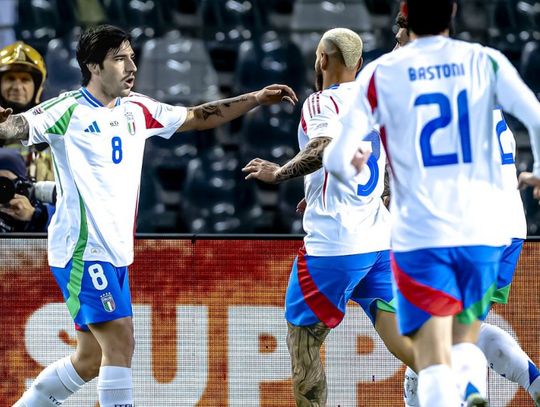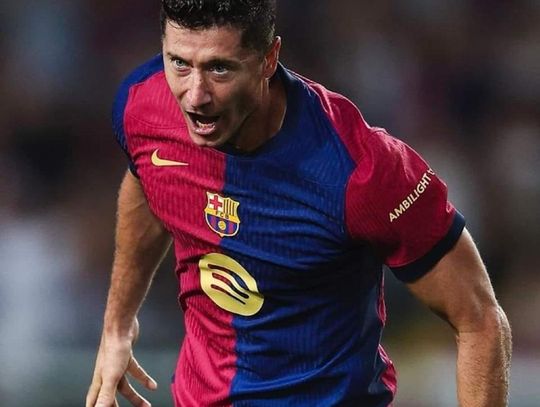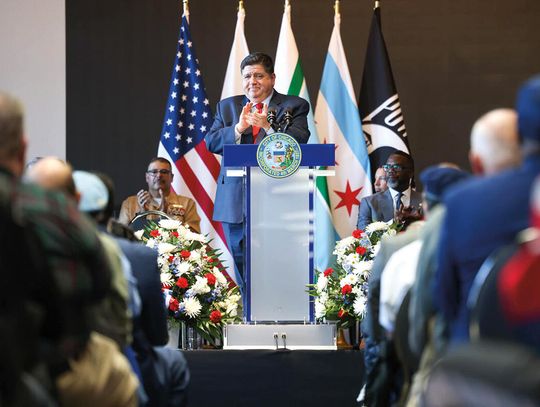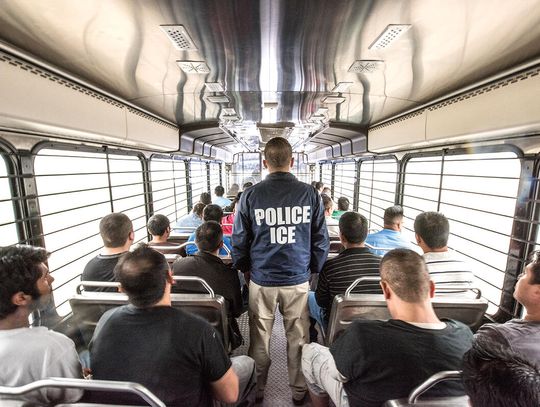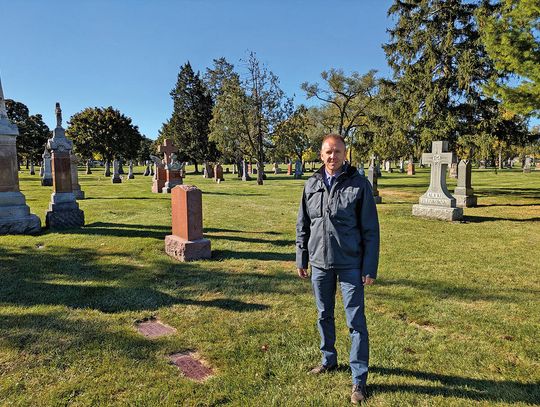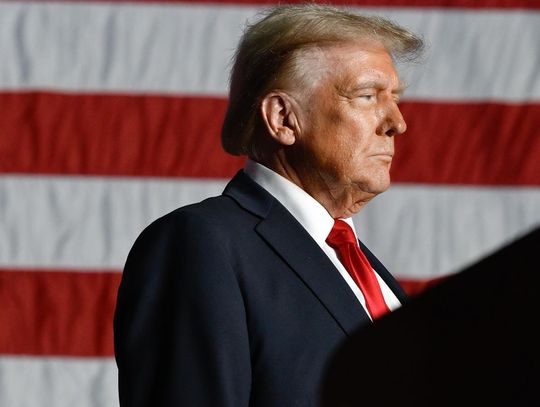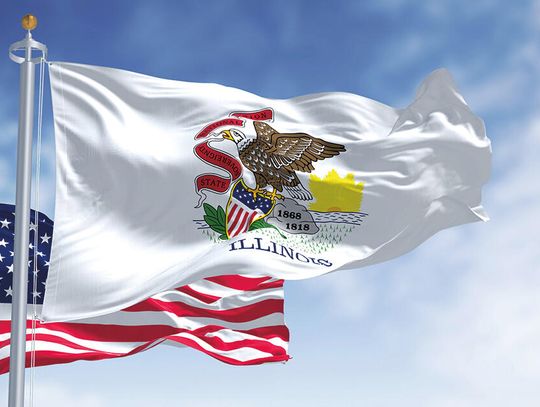The Warsaw Institute Foundation to pierwszy polski geopolityczny think tank w Stanach Zjednoczonych. Strategicznym celem tej organizacji jest wzmocnienie polskich interesów w USA przy jednoczesnym wspieraniu unikalnego sojuszu między dwoma narodami. Jej działalność koncentruje się na takich zagadnieniach jak geopolityka, porządek międzynarodowy, polityka historyczna, energetyka i bezpieczeństwo militarne. The Warsaw Institute Foundation została założona w 2018 roku i jest niezależną organizacją non-profit, inspirowaną bliźniaczą organizacją działającą w Polsce – Warsaw Institute. The Warsaw Institute Foundation is Poland's first geopolitical think tank in the United States. The strategic goal of this organisation is to bolster Polish interests in the U.S. while supporting the unique alliance between the two nations. Its activity focuses on such issues as geopolitics, international order, historical policy, energy, and military security. Established in 2018, The Warsaw Institute Foundation is an independent, non-profit organization inspired the twin Poland-based Warsaw Institute.
Wybory prezydenckie, które odbyły się w Polsce w maju i lipcu 2020 r., należy postrzegać przede wszystkim przez pryzmat dużego tryumfu demokracji. Do wyborów przystąpiły tłumy obywateli w Polsce i poza granicami kraju, zmobilizowanych we wszystkich elektoratach. Biorąc pod uwagę maraton wyborczy, który trwał w Polsce od maja 2019 r. (wybory do europarlamentu, następnie wybory parlamentarne), Polska kończy ten bieg ze złotym medalem na szyi. Demokracja rozkwita.
Wybory na Prezydenta Rzeczypospolitej Polskiej ze względu na pandemię koronawirusa zostały przesunięte z planowanej daty 10 maja br. na koniec miesiąca, czyli 28 maja. Frekwencja w pierwszej turze wyborów wyniosła 64,51 proc., co odczytywać należało już w kategoriach dużego sukcesu i mobilizacji dużej rzeszy Polaków. Pierwszą turę wygrał urzędujący prezydent Andrzej Duda, który uzyskał 43,5 proc. głosów (8 mln 450 tys. 513) – startował z poparciem rządzącej partii konserwatywnej Prawo i Sprawiedliwość. Na drugim miejscu uplasował się Rafał Trzaskowski, otrzymując poparcie 30,46 proc. głosów (5 mln 917 tys. 340), startujący z poparciem liberalnej Platformy Obywatelskiej. Na kolejnych miejscach znaleźli się bezpartyjny kandydat Szymon Hołownia 13,87 proc. (2 mln 693 tys. 397), kandydat prawicowej Konfederacji Krzysztof Bosak z poparciem 6,78 proc. (1 mln 317 tys. 380), Władysław Kosiniak-Kamysz, który reprezentował ludowców 2,36 proc. (459 tys. 365) i ultralewicowy Robert Biedroń z wynikiem 2,22 proc. (432 tys. 129). Pozostali kandydaci otrzymali w sumie 155 tys. 335 głosów.
W drugiej turze frekwencja wyborcza osiągnęła jeszcze lepszy wynik – do urn poszło 68,18 proc. wyborców. Była to największa frekwencja od czasów drugiej tury wyborów prezydenckich z 1995 r. Rozstrzygnięcie wyborów nie było pewne do ostatniej minuty, bowiem wszystkie sondażowe wyniki dawały obu kandydatom podobne rezultaty. Ostatecznie, ogłoszono zwycięstwo Andrzeja Dudy, który został wybrany na swoją drugą 5-letnią kadencję prezydencką. Panujący prezydent otrzymał poparcie 51,03 proc. wyborców, tj. 10 mln 440 tys. 648 głosów. Startującego z Platformy Obywatelskiej Rafała Trzaskowskiego wsparło 48,97 proc. głosujących, tj. 10 mln 018 tys. 263 osób.
Andrzej Duda to doświadczony polityk, od 6 sierpnia 2015 roku Prezydent RP. Jest doktorem nauk prawnych, w latach 2006–2007 sprawował funkcję podsekretarza stanu w Ministerstwie Sprawiedliwości, w latach 2008–2010 podsekretarza stanu w Kancelarii Prezydenta Lecha Kaczyńskiego, w latach 2007–2011 członka Trybunału Stanu oraz posła na Sejm VII kadencji (2011–2014) i posła do Parlamentu Europejskiego VIII kadencji (2014–2015). Jego program wyborczy to przede wszystkim deklaracja utrzymania programu 500+ (wsparcie państwa dla rodzin w postaci wypłacania 500 zł na każde dziecko w rodzinie), 13. emerytury (dodatkowa, 13. emerytura dla uprawnionych), i innych programów społecznych. Podczas toczącej się kampanii mówił także o dodatku solidarnościowym na czas pandemii (dodatek solidarnościowy jest świadczeniem przyznawanym od 1 czerwca do 31 sierpnia 2020 r. Jego wysokość to 1400 zł miesięcznie, przysługuje osobom, z którymi po 15 marca 2020 r. rozwiązano umowę o pracę za wypowiedzeniem i osobom, których umowa po tej dacie uległa rozwiązaniu z upływem czasu, na który była zawarta). Kolejne to rozwój Funduszu Medycznego i 6 proc. PKB na służbę zdrowia do 2024 r. Ważnym punktem kampanii był program walki ze smogiem, wsparcie termomodernizacji budynków jednorodzinnych oraz wymiany źródeł ciepła (na bardziej ekologiczne). Duży nacisk położono także na rozbudowę sieci kolejowej i rozbudowę infrastruktury. Kwestią, która została podniesiona w toku dyskusji kampanijnych, a którą już zrealizowano, jest bon turystyczny 1000+ jako wsparcie branży turystycznej podczas pandemii.
Rafał Trzaskowski od 2018 r. sprawuje urząd prezydenta miasta stołecznego Warszawy. Doktor nauk humanistycznych, poseł do Parlamentu Europejskiego VII kadencji (2009–2013), w latach 2013–2014 minister administracji i cyfryzacji, w latach 2014–2015 sekretarz stanu w Ministerstwie Spraw Zagranicznych, poseł na Sejm VIII kadencji (2015–2018), od 2020 r. wiceprzewodniczący Platformy Obywatelskiej. Jego program wyborczy opierał się przede wszystkim na deklaracji zwiększenia środków na służbę zdrowia, inwestycji w czyste powietrze (związane z nimi dotacje w wysokości 10 tys. złotych dla każdej rodziny, która podejmie wysiłek walki o czyste powietrze). Ważnym punktem jego kampanii był postulat wprowadzenia związków partnerskich i karty LGBT na terenie całego kraju. Kolejne pomysły to powołanie rzecznika kontroli państwowej w Biurze Bezpieczeństwa Narodowego, powołanie przez Prezydenta RP niezależnej osoby na stanowisko prokuratora generalnego, wzmocnienie pozycji polskich sił zbrojnych w NATO, zmiany polityki energetyczno-klimatycznej Polski (przyjęcie unijnego Zielonego Ładu dla Polski i rozpoczęcie stopniowego odchodzenia od węgla), a także równe szanse na rynku pracy (w wyrównaniu szans dla kobiet i mężczyzn miałby pomóc program budowy, a później oferowania, darmowych przedszkoli i żłobków w całej Polsce).
W zakresie poglądów na politykę zagraniczną należy podkreślić odmienność poglądów obu kandydatów. Andrzej Duda skupia się na relacjach ze Stanami Zjednoczonymi (dobre relacje z USA urzędującego prezydenta potwierdza jego wizyta w Waszyngtonie tuż przed I turą wyborów). W swoim programie w zakresie polityki zagranicznej prezydent Duda zauważał, że rozbudowa gazoportu w Świnoujściu oraz budowa gazociągu Baltic-Pipe spowoduje uniezależnienie się od dostaw gazu ziemnego z Rosji, które są niestabilne. Dzięki inicjatywie Trójmorza, która została zainicjowana podczas jego kadencji, Polska stała się ważnym partnerem dla Stanów Zjednoczonych w regionie, a to ma także znaczenie we wzmocnieniu Polski w strukturach Unii Europejskiej. Jak twierdzi: „Polska potrzebuje Europy, a Europa potrzebuje Polski”.
Rafał Trzaskowski za główny cel postawił sobie przywrócenie Polsce dobrej pozycji w Unii Europejskiej i NATO. W jego opinii: „wyłącznie Polska silna w Unii Europejskiej i NATO może być partnerem ważnym i istotnym dla wszystkich innych”. Według kandydata popieranego przez Platformę Obywatelską, Polska w ostatnich 5 latach pogorszyła swój wizerunek międzynarodowy. Trzaskowski w kampanii zapowiedział, że w pierwszą podróż wybrałby się do Brukseli, a następnie chciałby zaprosić do Warszawy prezydentów Francji i Niemiec, „żeby odnowić Trójkąt Weimarski”. W kwestii wzajemnych relacji Stanów Zjednoczonych i Niemiec stwierdził, iż „nawigowałby te relacje między Polską a ważnym sojusznikiem międzynarodowym i ważnym sojusznikiem militarnym”.
Wybory w Polsce zostały poddane badaniu specjalnej misji agendy OBWE, Biura Instytucji Demokratycznych i Praw Człowieka (ODIHR), która wydała w tej sprawie stanowisko oceniając przeprowadzenie drugiej tury wyborów prezydenckich w sposób prawidłowy. Jak wynika z powyższego, Polacy mieli pełen dostęp do wyboru kandydata, z którym się utożsamiają (biorąc pod uwagę poglądy, wartości, sposób prowadzenia polityki). Kandydaci w pierwszej turze reprezentowali poglądy od lewa do prawa strony politycznego sporu. Zaś wyniki wyborów pierwszej i drugiej tury pokazują, że Polacy zmobilizowali się, aby pójść do urn i wybrać kandydata, który reprezentuje ich wartości.
Ze względu na wybór przez obywateli kandydata popieranego przez konserwatywną partię Prawo i Sprawiedliwość, część opozycji zarzucała wybranemu Prezydentowi odrzucenie liberalnych wartości, tym samym łamanie demokracji. Należy jednak pamiętać na czym system demokratyczny polega. Opiera się bowiem nie tylko na liberalizmie, ale także na innych wartościach, w tym konserwatywnych, lewicowych i innych. Jednak już o tym, które wartości powinny odgrywać największe znaczenie, powinni każdorazowo decydować wyborcy. Tak właśnie stało się podczas omawianego procesu wyborczego w maju i czerwcu br. Wybory zostały przeprowadzone w pełni transparentnie, bez ograniczenia ich swobody odbywania w jakimkolwiek miejscu, nawet biorąc pod uwagę trudne warunki wynikające z sytuacji epidemicznej. Wyborcy mieli możliwość wpłynąć na wynik, wybierając „swojego” kandydata. Również dla jakości demokracji sprawą kluczową jest wolność mediów. Podczas kampanii prezydenckiej można było zauważyć, że media w Polsce są bardzo silnie zróżnicowane. Ogromna część mediów jest w rękach prywatnych, w tym media ogólnokrajowe, które wprost sprzyjają liberalnym wartościom.
Kolejnym dowodem wydanym przez wyborców o dobrym stanie demokracji w Polsce jest frekwencja wyborcza, która osiągnęła niemal rekordowy wynik od czasu transformacji. Biorąc pod uwagę dużą frekwencję oraz niemal zrównane wyniki obu kandydatów, należy jasno wskazać tryumf demokracji w Polsce. Opozycja dostała ogromny mandat do tego, aby patrzeć na ręce rządzącym i brać udział w merytorycznych sporach. Obaj kandydaci w sposób od dawna niespotykany zmobilizowali swoich wyborców, co znacząco podwyższyło frekwencję w drugiej turze wyborów.
Wyniki wyborów prezydenckich w Polsce są sukcesem demokracji, z czego Polacy powinni być dumni po 30 latach od transformacji ustrojowej. Wyborcy mają pewność, że reprezentuje ich prezydent, który realizuje ich poglądy i wartości (powierzenie mandatu temu samemu kandydatowi na drugą 5-letnią kadencję), a biorąc udział w wyborach mogą wpływać na sytuację i podejmowane kierunki działań w państwie. Opozycja zaś może bacznie przyglądać się prowadzonym sprawom i merytorycznie – zgodnie z dostępnymi w demokracji narzędziami – rozliczać urzędującego prezydenta i rządzących.
Autor: Redakcja The Warsaw Institute Foundation
The Warsaw Institute Foundation to pierwszy polski geopolityczny think tank w Stanach Zjednoczonych. Strategicznym celem tej organizacji jest wzmocnienie polskich interesów w USA przy jednoczesnym wspieraniu unikalnego sojuszu między dwoma narodami. Jej działalność koncentruje się na takich zagadnieniach jak geopolityka, porządek międzynarodowy, polityka historyczna, energetyka i bezpieczeństwo militarne. The Warsaw Institute Foundation została założona w 2018 roku i jest niezależną organizacją non-profit, inspirowaną bliźniaczą organizacją działającą w Polsce – Warsaw Institute. The Warsaw Institute Foundation is Poland's first geopolitical think tank in the United States. The strategic goal of this organisation is to bolster Polish interests in the U.S. while supporting the unique alliance between the two nations. Its activity focuses on such issues as geopolitics, international order, historical policy, energy, and military security. Established in 2018, The Warsaw Institute Foundation is an independent, non-profit organization inspired the twin Poland-based Warsaw Institute.
The Warsaw Institute Foundation to pierwszy polski geopolityczny think tank w Stanach Zjednoczonych. Strategicznym celem tej organizacji jest wzmocnienie polskich interesów w USA przy jednoczesnym wspieraniu unikalnego sojuszu między dwoma narodami. Jej działalność koncentruje się na takich zagadnieniach jak geopolityka, porządek międzynarodowy, polityka historyczna, energetyka i bezpieczeństwo militarne. The Warsaw Institute Foundation została założona w 2018 roku i jest niezależną organizacją non-profit, inspirowaną bliźniaczą organizacją działającą w Polsce – Warsaw Institute. The Warsaw Institute Foundation is Poland's first geopolitical think tank in the United States. The strategic goal of this organisation is to bolster Polish interests in the U.S. while supporting the unique alliance between the two nations. Its activity focuses on such issues as geopolitics, international order, historical policy, energy, and military security. Established in 2018, The Warsaw Institute Foundation is an independent, non-profit organization inspired the twin Poland-based Warsaw Institute.
Reklama



